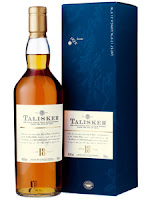Experts Crown Talisker The Worlds Best Single Malt
Talisker 18 Year Old is World's Best Single Malt Whiskey, say Experts
Talisker 18 year old was declared the world's Best Single Malt Whisky by a panel of whisky experts yesterday in Glasgow.
 The famous single malt whisky distilled on the remote island of Skye emerged as overall winner in the World Whiskies Awards, who announced their results after three rounds of blind tasting by independent whisky experts. Chaired by whisky expert Dave Broom, the World Whiskies Awards are organized by Whisky Magazine, the leading specialist publication on world whiskies.
The famous single malt whisky distilled on the remote island of Skye emerged as overall winner in the World Whiskies Awards, who announced their results after three rounds of blind tasting by independent whisky experts. Chaired by whisky expert Dave Broom, the World Whiskies Awards are organized by Whisky Magazine, the leading specialist publication on world whiskies.One judge commented: "Whisky doesn't get much finer than this".
In the latest World Whiskies Awards rankings, Talisker 18 year old was also declared Best Island (non-Islay) single malt whisky. The award for Best Islay (peated) single malt whisky went to another Classic Malts Selection™ single malt whisky, Lagavulin™ Distillers Edition.
Among the sub-category winners, Talisker 10 year old was awarded Best Island (non-Islay) single malt whisky under 12 Years Old. Caol Ila™ 8 year old was declared Best Islay (unpeated) single malt whisky under 12 Years Old.
This latest accolade follows last year’s announcement that the International Wine & Spirit Competition had awarded Talisker 18 year old the Trophy for the Single Malt Scotch Whisky over 15 years old.
Talisker™The distillery was built in 1830 by Hugh and Kenneth MacAskill, beside Loch Harport. The name comes from the Norse, “Thalas Gair”, meaning "Sloping Rock". The whisky was already famous by 1880 as "The king o'drinks..." (R. L. Stevenson). The 10 year old expression of Talisker is the most award winning single malt in its class. It is the only single malt Scotch Whisky made on the island of Skye. Talisker forms part of the Classic Malts Selection - see www.malts.com. The 18 year old expression was added to the Talisker family in 2004.









